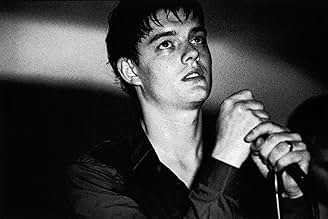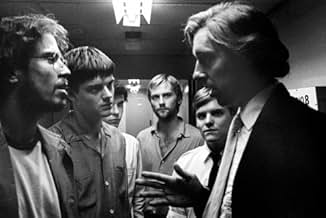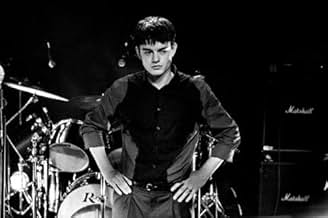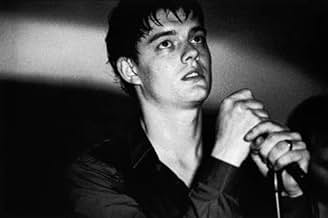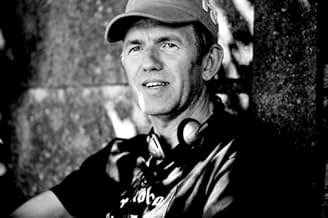Control
- 2007
- Tous publics
- 2h 2m
IMDb RATING
7.6/10
71K
YOUR RATING
A profile of Ian Curtis, the enigmatic singer of Joy Division whose personal, professional, and romantic troubles led him to die by suicide at the age of 23.A profile of Ian Curtis, the enigmatic singer of Joy Division whose personal, professional, and romantic troubles led him to die by suicide at the age of 23.A profile of Ian Curtis, the enigmatic singer of Joy Division whose personal, professional, and romantic troubles led him to die by suicide at the age of 23.
- Director
- Writers
- Stars
- Won 1 BAFTA Award
- 31 wins & 36 nominations total
Martha Myers Lowe
- Ian's Sister
- (as Martha Myers-Lowe)
Mary Jo Randle
- Debbie's Mother
- (as Mary-Jo Randle)
- Director
- Writers
- All cast & crew
- Production, box office & more at IMDbPro
Featured reviews
It's 1973 Macclesfield, England. Ian Curtis (Sam Riley) is a quiet enigmatic student. He marries Debbie Woodruff (Samantha Morton) in 1975. He works as an employment agent. On June 4, 1976, they attend a small Sex Pistols concert. Also in attendance are Bernard Sumner, Peter Hook, and Terry Mason. Ian joins them as their lead singer. They call themselves Warsaw and eventually Joy Division.
There is a sense of disconnection from this movie and a mystery about Ian Curtis. Sam Riley's performance, the long takes, and the black and white photography all make Ian an enigma. It's a slow burn but compelling. The tone is sad and respectful. It's very fitting of the band and its music.
There is a sense of disconnection from this movie and a mystery about Ian Curtis. Sam Riley's performance, the long takes, and the black and white photography all make Ian an enigma. It's a slow burn but compelling. The tone is sad and respectful. It's very fitting of the band and its music.
Days away from embarking on a long dreamed about tour of the United States, Ian Curtis, the lead singer of the band Joy Division, hanged himself on May 23, 1980 from a rope in the kitchen of his apartment. His suicide not only ended his promising young life but also the dreams of a generation. Twenty seven years after his death, the eulogizing continues. Last year saw a documentary by Christian Davies: Joy Division: Under Review and this year has brought two more films: Joy Division: The Last True Story In Pop by Grant Gee and Control, the winner of the Camera d'Or at the Cannes Film Festival. Based on the 1996 memoir "Touching From a Distance" by Ian's widow Deborah Curtis, the film follows Curtis' life from his teenage years to his tragic death at age twenty three.
Unlike conventional bio-pics like Ray and Walk the Line with their star glamorizing propensities, Control delivers a three-dimensional portrait of a real human being and how his troubles affected the people closest to him. The film is directed by photographer and video director Anton Corbijn, a celebrated photographer who took some of the most recognized photos of Joy Division. Because he knew and worked with the band, the emotional connection to its subject is palpable. The film is shot in black and white and the choice underscores the grayness of Curtis' home town of Macclesfield, England and the grim mood of much of the work.
The major reason for the film's success, however, rests with lead actor Sam Riley who eerily recreates Curtis in appearance and voice. He performs all of the band's iconic songs such as Atmosphere, Love Will Tear Us Apart, and Twenty-Four Hours himself, using Curtis' robotic hand motions on stage to great effect. Another outstanding performance is that of Samantha Morton who plays Deborah Curtis, Ian's loving and patient wife who is overwhelmed by her husband's success and her new responsibilities as a mother of their daughter. Married at a very young age, both husband and wife lack the strength to make a go of it especially with the pressure of Curtis' epileptic seizures growing worse, and Ian's on again off again affair with Belgian journalist Annik (Alexandra Maria Lara).
Though the subject matter is melancholy, Matt Greenhalgh's script provides a light touch filled with trenchant one-liners from the group's manager Rob Gretton (Tony Kebbell) and witty remarks from band members Joe Anderson, James Anthony Pearson and Harry Treadaway. Although Curtis has become one of rock's most mythologized figures, Riley plays him simply as a very innocent, down to earth young man whose talent was much greater than his ability to handle it. Control is an extremely moving experience whether or not you have foreknowledge of the events of Curtis' life. It is a film that has the power to touch and leave memories that are indelible.
Unlike conventional bio-pics like Ray and Walk the Line with their star glamorizing propensities, Control delivers a three-dimensional portrait of a real human being and how his troubles affected the people closest to him. The film is directed by photographer and video director Anton Corbijn, a celebrated photographer who took some of the most recognized photos of Joy Division. Because he knew and worked with the band, the emotional connection to its subject is palpable. The film is shot in black and white and the choice underscores the grayness of Curtis' home town of Macclesfield, England and the grim mood of much of the work.
The major reason for the film's success, however, rests with lead actor Sam Riley who eerily recreates Curtis in appearance and voice. He performs all of the band's iconic songs such as Atmosphere, Love Will Tear Us Apart, and Twenty-Four Hours himself, using Curtis' robotic hand motions on stage to great effect. Another outstanding performance is that of Samantha Morton who plays Deborah Curtis, Ian's loving and patient wife who is overwhelmed by her husband's success and her new responsibilities as a mother of their daughter. Married at a very young age, both husband and wife lack the strength to make a go of it especially with the pressure of Curtis' epileptic seizures growing worse, and Ian's on again off again affair with Belgian journalist Annik (Alexandra Maria Lara).
Though the subject matter is melancholy, Matt Greenhalgh's script provides a light touch filled with trenchant one-liners from the group's manager Rob Gretton (Tony Kebbell) and witty remarks from band members Joe Anderson, James Anthony Pearson and Harry Treadaway. Although Curtis has become one of rock's most mythologized figures, Riley plays him simply as a very innocent, down to earth young man whose talent was much greater than his ability to handle it. Control is an extremely moving experience whether or not you have foreknowledge of the events of Curtis' life. It is a film that has the power to touch and leave memories that are indelible.
Control, a biopic about a band from Manchester, is getting serious attention from around the world. Starting with an award in Cannes. That's maybe more than you might expect. Joy Division, a respected band of the 70s, are hardly a name on everyone's lips. And films made by ex music video directors about yet another load of rockers rarely raise eyebrows. So why is this different? Joy Division, for non-initiates, were a post-punk Manchester band of throbbing guitars and dark, doom-laden lyrics. Recognition in the music biz (especially by other musicians) was perhaps even greater after the death of lead singer, Ian Curtis. Control covers a period from his schooldays to his end in 1980 (aged 23). It is based on the biography of his widow.
Control uses Curtis' love of poetry, as well as the more familiar songs-that-tell-a-story device, to provide at least scant insight into the music. "I wish I were a Warhol silkscreen, hanging on the wall," he muses. But what is dealt with in much more detail is his growing sense of isolation, coping with epilepsy as the pressures of touring build up, and the distraught domestic relations he is embroiled in with wife Debbie (Samantha Morton) and romantic-interest-from-afar Annik (Alexandra Maria Lara). "It's like it's not happening to me but someone pretending to be me. Someone dressed in my skin," he says.
In a telling scene when he is under hypnosis, the camera revolves around his head as we hear voices speaking to him. "Ian, let me in, love," says his wife, "there's room to talk." Responsibilities as husband and father. A mistress who is also in love with him. A band and fan following who want more than he can give. From warholian, carefree screen-dream of youth, he has arrived at a place where he doesn't want to be. Drugs and their side-effects no longer a schoolboy's recreational laugh. Prescription bottles grip with morbid fascination. And the knowledge that doctors don't have a cure.
The film carries viewers away with blistering intensity. Relative newcomer Sam Riley plays Curtis with alarming energy. With Samantha Morton, it's not what she says but what you see going through her mind. She contains her expressiveness for the camera to pick up (rather than thrusting it on us). We want to cry inside for her character. As a feat of interiorisation, Control puts her as a contender in the shoes of Meryl Streep.
Supporting cast members come through with believability and sincerity, sparkling with well-honed contrasts. Toby Kebbell, fast-talking manager Rob, lifts us out of the depressive mood with wisecracks enough to make legless monkeys jump. "Where's my £20?" asks a hapless stand-in as Rob deals with an emergency. "In my f*ck-off pocket!" he barks back. Craig Parkinson is record producer and late TV presenter Tony Wilson (to whom the opening screening at the Edinburgh International Film Festival was dedicated). He demonstrates fine shades of teeth-gritting tolerance, explaining to the band, seconds before their first live TV show: yes, 'large dog's c*ck' counts as swearing, and would mean the broadcast is pulled. Established Romanian actress, Alexandra Maria Lara, succeeds in making Annik far more than the two-dimensional bit-of-fluff that would have been an easy course. As potential home-breaker, it is tempting to hate her, yet her character is shown with the intellectual appreciation and chemistry that Debbie can no longer offer.
Morton, in the Q&A after the Edinburgh premiere, links the film to Saturday Night and Sunday Morning. It is the kitchen-sink, downtrodden existence that her Debbie inhabits. Cinematography is also reminiscent of this period, with its careful black-and-white observation of working class streets. I watched it a second time, enjoying careful compositions and suggestive mise-en-scene. But director Anton Corbijn is typically modest. "I really wanted you to look at the actors on the screen and only afterwards at the look of the film." While Ian, in Debbie's eyes, might be the licentious and 'angry young man' of social realism drama, the Control scenes from which she is tormentedly absent show another side: the world experienced by her husband (a reference in the film likens his isolation to Brando's character in Apocalypse Now).
"And we would go on as though nothing was wrong. And hide from these days we remained all alone."
Riley takes on manic expressions as if marching away from an impending epileptic fit while singing Transmission. It is such a potent, almost frightening feat, that we have to shake ourselves to remember he only got the part when he was stuck for a job. "Not a lot was going on in my life before this, so I was appreciative for the work and the money," he tells the opening night audience. "I imagine this will have opened doors for you," I had said to him earlier; he smiled like a man who still can't believe his good luck. But the 'luck' is very well deserved. His 'Ian' is physically and mentally complex. When I had managed to stop him on the Red Carpet long enough to congratulate him, Mr Riley explains that he had a friend who was an epileptic. "I witnessed an attack often enough to be able to copy it."
Although the film has a driving energy that takes our breath away, it drifts a little towards the tragic conclusion. We know the ending and it is a case of waiting for it to happen. And although it features plenty of excellent Joy Division tracks, any music biopic will never be good enough or accurate enough for some fans.
Fortunately this is not just for music fans but for serious film fans as well. It careers in a tightly controlled arc, where music biopic meets cinematic excellence. Why should you see it? "Some people visit the past for sentimental reasons," says Corbijn. "Some people visit the past to understand the present better." Control is not in the sentimental exercise category.
Control uses Curtis' love of poetry, as well as the more familiar songs-that-tell-a-story device, to provide at least scant insight into the music. "I wish I were a Warhol silkscreen, hanging on the wall," he muses. But what is dealt with in much more detail is his growing sense of isolation, coping with epilepsy as the pressures of touring build up, and the distraught domestic relations he is embroiled in with wife Debbie (Samantha Morton) and romantic-interest-from-afar Annik (Alexandra Maria Lara). "It's like it's not happening to me but someone pretending to be me. Someone dressed in my skin," he says.
In a telling scene when he is under hypnosis, the camera revolves around his head as we hear voices speaking to him. "Ian, let me in, love," says his wife, "there's room to talk." Responsibilities as husband and father. A mistress who is also in love with him. A band and fan following who want more than he can give. From warholian, carefree screen-dream of youth, he has arrived at a place where he doesn't want to be. Drugs and their side-effects no longer a schoolboy's recreational laugh. Prescription bottles grip with morbid fascination. And the knowledge that doctors don't have a cure.
The film carries viewers away with blistering intensity. Relative newcomer Sam Riley plays Curtis with alarming energy. With Samantha Morton, it's not what she says but what you see going through her mind. She contains her expressiveness for the camera to pick up (rather than thrusting it on us). We want to cry inside for her character. As a feat of interiorisation, Control puts her as a contender in the shoes of Meryl Streep.
Supporting cast members come through with believability and sincerity, sparkling with well-honed contrasts. Toby Kebbell, fast-talking manager Rob, lifts us out of the depressive mood with wisecracks enough to make legless monkeys jump. "Where's my £20?" asks a hapless stand-in as Rob deals with an emergency. "In my f*ck-off pocket!" he barks back. Craig Parkinson is record producer and late TV presenter Tony Wilson (to whom the opening screening at the Edinburgh International Film Festival was dedicated). He demonstrates fine shades of teeth-gritting tolerance, explaining to the band, seconds before their first live TV show: yes, 'large dog's c*ck' counts as swearing, and would mean the broadcast is pulled. Established Romanian actress, Alexandra Maria Lara, succeeds in making Annik far more than the two-dimensional bit-of-fluff that would have been an easy course. As potential home-breaker, it is tempting to hate her, yet her character is shown with the intellectual appreciation and chemistry that Debbie can no longer offer.
Morton, in the Q&A after the Edinburgh premiere, links the film to Saturday Night and Sunday Morning. It is the kitchen-sink, downtrodden existence that her Debbie inhabits. Cinematography is also reminiscent of this period, with its careful black-and-white observation of working class streets. I watched it a second time, enjoying careful compositions and suggestive mise-en-scene. But director Anton Corbijn is typically modest. "I really wanted you to look at the actors on the screen and only afterwards at the look of the film." While Ian, in Debbie's eyes, might be the licentious and 'angry young man' of social realism drama, the Control scenes from which she is tormentedly absent show another side: the world experienced by her husband (a reference in the film likens his isolation to Brando's character in Apocalypse Now).
"And we would go on as though nothing was wrong. And hide from these days we remained all alone."
Riley takes on manic expressions as if marching away from an impending epileptic fit while singing Transmission. It is such a potent, almost frightening feat, that we have to shake ourselves to remember he only got the part when he was stuck for a job. "Not a lot was going on in my life before this, so I was appreciative for the work and the money," he tells the opening night audience. "I imagine this will have opened doors for you," I had said to him earlier; he smiled like a man who still can't believe his good luck. But the 'luck' is very well deserved. His 'Ian' is physically and mentally complex. When I had managed to stop him on the Red Carpet long enough to congratulate him, Mr Riley explains that he had a friend who was an epileptic. "I witnessed an attack often enough to be able to copy it."
Although the film has a driving energy that takes our breath away, it drifts a little towards the tragic conclusion. We know the ending and it is a case of waiting for it to happen. And although it features plenty of excellent Joy Division tracks, any music biopic will never be good enough or accurate enough for some fans.
Fortunately this is not just for music fans but for serious film fans as well. It careers in a tightly controlled arc, where music biopic meets cinematic excellence. Why should you see it? "Some people visit the past for sentimental reasons," says Corbijn. "Some people visit the past to understand the present better." Control is not in the sentimental exercise category.
8tmk1
I saw this film last night then I went home and read a lot of the comments here. I think some things have been missed between the glowing reviews and the bitter disappointments.
First, it is a truly beautiful film and I found the acting uniformly excellent. That has already been said plenty of times.
More interesting to me are the comments about this not being an accurate or fair portrait of Ian Curtis and those around him. I've read plenty of accounts that characterize Ian and his band-mates as relentless practical jokers -- the book Torn Apart by Mick Middles and Lindsay Reade is full of these anecdotes. But I also think it's naive to expect a film like this to be anything close to a fair and objective telling of anyone's life. This is a dramatic interpretation, not a documentary.
In addition to the multiple meanings the title has for the characters in the film, this film is itself an exercise in CONTROL: Deborah Curtis's control over her husband's legacy; the surviving band members' control over the public image of Joy Division.
No, the film does not show the laughs and good times the band had, but this is in keeping with all of Joy Division's work. Their entire output as a living band was highly stylized. Almost everything they issued was in stark black and white; their imagery was overwhelmingly bleak and funereal; and they certainly courted controversy with their name and imagery. All of which was very consciously and tightly CONTROLLED by the band and the people at Factory. They gave few interviews and preferred to let the work speak for itself.
My point is that this film simply continues that project. It is yet another highly stylized piece of work in the Joy Division canon. To paraphrase the Tony Wilson remark that has been cited elsewhere in these comments -- when you have the choice between the legend and the facts, go with the legend. Their work has always had an epic, legendary quality. This movie is absolutely in keeping with that aesthetic.
I think it's also worth noting that Corbijn was a participant in shaping the Joy Division legacy from the very start -- his photographs of the band helped shape their image and his video for "Atmosphere" set the tone for how their legacy would be preserved. CONTROL is simply another collaboration with the band and their music. An extension of that original project.
I think that ultimately this film is an excellent piece of work. Just as Joy Division produced music of astonishing beauty and resonance out of the misery of life in post-industrial England, this film turns personal pain and loss into a powerful piece of art.
First, it is a truly beautiful film and I found the acting uniformly excellent. That has already been said plenty of times.
More interesting to me are the comments about this not being an accurate or fair portrait of Ian Curtis and those around him. I've read plenty of accounts that characterize Ian and his band-mates as relentless practical jokers -- the book Torn Apart by Mick Middles and Lindsay Reade is full of these anecdotes. But I also think it's naive to expect a film like this to be anything close to a fair and objective telling of anyone's life. This is a dramatic interpretation, not a documentary.
In addition to the multiple meanings the title has for the characters in the film, this film is itself an exercise in CONTROL: Deborah Curtis's control over her husband's legacy; the surviving band members' control over the public image of Joy Division.
No, the film does not show the laughs and good times the band had, but this is in keeping with all of Joy Division's work. Their entire output as a living band was highly stylized. Almost everything they issued was in stark black and white; their imagery was overwhelmingly bleak and funereal; and they certainly courted controversy with their name and imagery. All of which was very consciously and tightly CONTROLLED by the band and the people at Factory. They gave few interviews and preferred to let the work speak for itself.
My point is that this film simply continues that project. It is yet another highly stylized piece of work in the Joy Division canon. To paraphrase the Tony Wilson remark that has been cited elsewhere in these comments -- when you have the choice between the legend and the facts, go with the legend. Their work has always had an epic, legendary quality. This movie is absolutely in keeping with that aesthetic.
I think it's also worth noting that Corbijn was a participant in shaping the Joy Division legacy from the very start -- his photographs of the band helped shape their image and his video for "Atmosphere" set the tone for how their legacy would be preserved. CONTROL is simply another collaboration with the band and their music. An extension of that original project.
I think that ultimately this film is an excellent piece of work. Just as Joy Division produced music of astonishing beauty and resonance out of the misery of life in post-industrial England, this film turns personal pain and loss into a powerful piece of art.
The first thing that strikes you about 'Control' is its silence, and the chilly beauty of its black and white images. As a still photographer first-time director Anton Corbijn photographed Joy Division in black and white during their short existence. He knows how to get the remorselessly grim feel of the north of England in the late Seventies. (The boys came from the outskirts of Manchester. Joy Division formed in 1976.) This film (there's a documentary just coming out on the band too) is loosely based on a memoir of her marriage by Deborah Curtis, lead singer Ian Curtis' young wife, who had a baby girl by him and then tragically found him after he'd hanged himself in 1980, two months short of his twenty-fourth birthday, just as the band was to tour America for the first time.
'Control's' strength is a certain recessiveness. In the English style, it's offhand and avoids huge dramatic crescendos. That's refreshing. And besides the images and the restraint, the film is worth seeing for the concert sequences. The cast actually plays the Joy Division music live, and Sam Riley, who plays Ian Curtis, not only closely resembles him, but is a riveting and intense, almost at times scary, performer. When he says the public doesn't know how much of himself he puts into his performances, we know what he means.
The film is excellent at showing Ian's dilemmas. The band is a sudden success. He has an attack in their car as the band returns from a gig. Doctors tell him he has a form of epilepsy. He's given a fistful of pills to take every day and told to have early nights and stay off the booze. How faithfully he takes the pills is unclear but he suffers from their side effects in various ways, while late nights and booze are essentials of his existence. It doesn't seem that the English doctors knew very well how to treat him, and he was so busy performing he didn't take the time to go to specialists and have more extensive tests.
Ian had gotten married to Deborah (Samantha Morton) early--too early. On the road he meets a Belgian part-time journalist, Annik Honoré (Alexandra Maria Lara), and they fall uneasily in love. He's not strong enough to decide between the two women. Fear that his disease will only get worse hounds him, and the fits go on. Riley is fascinating to watch as he undergoes an increasingly visible meltdown. Other cast members are cyphers, though Joe Anderson, who has the role of Max in Taymor's Across the Universe, is the lead guitarist. Morton has a drab role but Deborah's unfortunate situation is present as a constant counterpart to Ian's story. The two other important characters are the Manchester music guru Tony Wilson (Craig Parkinson) and the band's wise-guy manager Rob Gretton (Toby Kebbell).
The creative inspiration of the band, the nature of their songs, the cast of their lyrics, the reason why Joy Division is a cult band today when it only existed for four years--these are matters the film is unable to elucidate. Watch it for the cool visuals, for the tall, soulful Sam Riley, and for the terrific live performance scenes. Enjoy the understatement, and the silence. Don't expect more.
Harvey Weinstein has chosen both for Control and for the soon-to-open Todd Haynes Bob Dylan film I'm Not There to have a slowly-unrolling distribution system, and hopes to bestow early cult status on both films by having them premiere at that temple of cinephilia, Film Forum, in lower Manhattan, New York City, and wait for the buzz of the cognoscenti to multiply and spread. It may work. But both films are tough sells. But A.E. Scott of the NYTimes has said Control is "enigmatic and moving, much in the manner of Joy Division's best songs." And that's a good send-off.
'Control's' strength is a certain recessiveness. In the English style, it's offhand and avoids huge dramatic crescendos. That's refreshing. And besides the images and the restraint, the film is worth seeing for the concert sequences. The cast actually plays the Joy Division music live, and Sam Riley, who plays Ian Curtis, not only closely resembles him, but is a riveting and intense, almost at times scary, performer. When he says the public doesn't know how much of himself he puts into his performances, we know what he means.
The film is excellent at showing Ian's dilemmas. The band is a sudden success. He has an attack in their car as the band returns from a gig. Doctors tell him he has a form of epilepsy. He's given a fistful of pills to take every day and told to have early nights and stay off the booze. How faithfully he takes the pills is unclear but he suffers from their side effects in various ways, while late nights and booze are essentials of his existence. It doesn't seem that the English doctors knew very well how to treat him, and he was so busy performing he didn't take the time to go to specialists and have more extensive tests.
Ian had gotten married to Deborah (Samantha Morton) early--too early. On the road he meets a Belgian part-time journalist, Annik Honoré (Alexandra Maria Lara), and they fall uneasily in love. He's not strong enough to decide between the two women. Fear that his disease will only get worse hounds him, and the fits go on. Riley is fascinating to watch as he undergoes an increasingly visible meltdown. Other cast members are cyphers, though Joe Anderson, who has the role of Max in Taymor's Across the Universe, is the lead guitarist. Morton has a drab role but Deborah's unfortunate situation is present as a constant counterpart to Ian's story. The two other important characters are the Manchester music guru Tony Wilson (Craig Parkinson) and the band's wise-guy manager Rob Gretton (Toby Kebbell).
The creative inspiration of the band, the nature of their songs, the cast of their lyrics, the reason why Joy Division is a cult band today when it only existed for four years--these are matters the film is unable to elucidate. Watch it for the cool visuals, for the tall, soulful Sam Riley, and for the terrific live performance scenes. Enjoy the understatement, and the silence. Don't expect more.
Harvey Weinstein has chosen both for Control and for the soon-to-open Todd Haynes Bob Dylan film I'm Not There to have a slowly-unrolling distribution system, and hopes to bestow early cult status on both films by having them premiere at that temple of cinephilia, Film Forum, in lower Manhattan, New York City, and wait for the buzz of the cognoscenti to multiply and spread. It may work. But both films are tough sells. But A.E. Scott of the NYTimes has said Control is "enigmatic and moving, much in the manner of Joy Division's best songs." And that's a good send-off.
Did you know
- TriviaThe actors playing Joy Division learned how to play the songs themselves. So the scenes where the band is playing live is not from tape, but actually the actors playing live.
- GoofsJoy Division is shown performing "Transmission" on Tony Wilson's television show in September 1978, but in reality, they performed "Shadowplay". The performance that is represented in this scene actually took place a year later in September 1979 on the BBC2 program "Something Else", when they performed "Transmission" (a performance which was used as the music video for the song) and "She's Lost Control".
- Quotes
Ian Curtis: Existence. Well, what does it matter? I exist on the best terms I can. The past is now part of my future. The present is well out of hand.
- Crazy creditsSPOILER: Epilogue: "Ian Curtis died May 18, 1980. He was 23 years old."
- SoundtracksDrive-In Saturday
(David Bowie)
Published by kind permission of Tintoretto Music/RZO Music Ltd/EMI Music Publishing Ltd/Chrysalis Music Ltd © 1973
Performed by David Bowie
Courtesy of RZO Music
Details
- Release date
- Countries of origin
- Official site
- Language
- Also known as
- Контроль
- Filming locations
- Production companies
- See more company credits at IMDbPro
Box office
- Budget
- €4,500,000 (estimated)
- Gross US & Canada
- $872,252
- Opening weekend US & Canada
- $27,674
- Oct 14, 2007
- Gross worldwide
- $8,159,996
- Runtime
- 2h 2m(122 min)
- Color
- Sound mix
- Aspect ratio
- 2.35 : 1
Contribute to this page
Suggest an edit or add missing content





